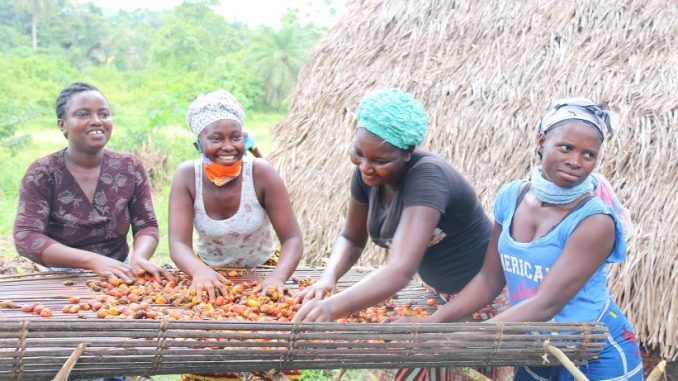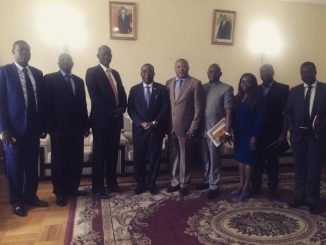
We are escorted into the bush of mainly palm trees about half a mile or more from the dwellings of Kamasu village, Tunkia Chiefdom, Kenema District, Eastern Sierra Leone. The villagers say they only allowed us because we are journalists. The rule is that during this COVID-19 ‘no strangers are allowed’.
“We are observing the precautionary measures,” says one of our escorts, referencing the COVID-19 bye laws put in place by the village Chief, and adjusting his locally made face mask which keeps sliding while he talks.
In a cleared area within the palm tree plantations, a group of men and women are busy producing palm oil using a Sierra Leonean-made oil processing machine. One woman is emptying boiled palm kernels into the mouth of the machine while two others- two at both ends of a long stick passed through the top hub of the processor- are pushing the stick in circle until the peels are squashed. It is a hard job, especially for the women, but not as physically demanding as the traditional method of using their feet and later pounding.
Before they had the machine, it’s a rigid process to produce palm oil according to Baby Bockarie, one of the farmers, who is also the wife of the village Chief.
“We used to carry the palm kernels on our heads, dig a hole and dump them, cover them with palm fronds for a couple of days and stamp with our feet. After that we do a lot of pounding as well. Now, with this machine given to us by SEND Sierra Leone, it is easier, faster, cleaner and we produce more,” explains Baby Bockarie.
Before the machine, she explains further, it takes two to three days to process a drum full of palm kernels. They will boil today, stamp in a hole the next day and pound on the day after. Now it takes less than a day to process the same quantity of palm kernels.
In a day the machine can process for three groups under the gender model family (GMF), each comprising of 15 or more members. On this particular day the processing is for Baby Bockarie’s group. The GMF encourages the families to operate as a unified unit with shared responsibilities among family members. We understand later that it is the vehicle the NGO uses to roll out community development initiatives like the oil palm processing machine by enhancing community cohesion and mobilisation.
Under the GMF, the families benefit from trainings in family life, health and hygiene best practices, small business development and savings, best agronomic practices, natural management of pest and diseases control, farm size experience through “smart” agriculture and resilience farming through “Climate smart” agriculture.
“We used to quarrel a lot within the family and with our neighbours, and usually we end up at the Chief’s house to resolve the conflicts. After the trainings we have learnt to live together in peace and respect for one another. If there are any issues they are settled within the group,” explains Chief Bockarie Koroma, who also participates in the palm oil processing.
The Bockarie’s have four children, two males and two females. Both family heads don’t know their ages or dates of birth.
The trainings have also helped the villagers to maintain a healthy environment by cleaning their communities and even their farms regularly, digging pits some distance off the community to dump garbage, ensuring each household has a toilet, erect cloth lines to dry their clothes and build tables for cooking utensils such as plates, pans, bowls and pots.
Diversified agriculture has increased their number of nutritious crops cultivated in the past two years and thus improve their nutrition status. In addition to other nutritious crops (Benni, Beans, Maize, Banana and Plantain) supplied to them in the first year of the project, they have been supplied additional groundnut seeds this planting season as group support which account for four acres of groundnut farmland cultivated this year.
By this time a group of staff of the NGO has joined us. They are traveling from one village to another inspecting their project activities. The oil palm presser is provided to the community under a project called Linking Agriculture, Nutrition and Natural Resources (LANN+) funded by German donor agency WHH.
“This project seeks to promote income generation for the locals through value addition to their products,” explains Tity Simbo Kamara, the Program Manager of the project.
Apart from the individual household farms, the community has eight acres of palm oil plantation. Proceeds from the community plantation is re-invested in other agricultural products while some amount is saved for maintenance of the machine. The GMF households also do the same. A small fee is charged for use of the machine. For every drum of palm oil produced, one gallon is given to the community as fee. Neighbouring villages such as Hao and Jewahun sometimes also borrow the machine to process their produce and pay the fee. Chief Bockarie lead us to a store in the village where they keep them. We count 70 jerry cans of palm oil they have collected since they received the processing machine in February 2020. There’s a secretary that keeps record of the payments.
They could have had more in store if it were not for the COVID-19 pandemic, according to the store keeper.
“The government restrictions and the lockdown are affecting our work,” he laments. “ ‘Dawei’ (the periodic market) is suspended and seeds are difficult to get. Farming is by season and the rains are almost here.”
For the about 1000 people of Kamasu village, COVID-19 will soon go away and life will return to normal.
“We can’t wait for this sickness to end. We want to go back to our farms and work full time. We are not used to sitting at home idly,” says Baby Bockarie.
Story by Ahmed Sahid Nasralla, (President of the Sierra Leone Association of Journalists), and Alhaji Manika Kamara.


